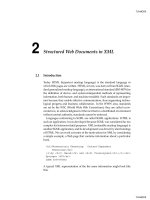Lecture management a pacific rim focus chapter 2 pioneering ideas in management
Bạn đang xem bản rút gọn của tài liệu. Xem và tải ngay bản đầy đủ của tài liệu tại đây (404.53 KB, 27 trang )
CHAPTER 2
PIONEERING IDEAS IN
MANAGEMENT
© 2003 McGraw-Hill Australia Pty Ltd. PowerPoint
1
Lecture outline
•
•
•
•
•
•
Early management ideas
Classical theorists
Behavioural theorists
Quantitative approach
Contemporary ideas
Innovation & management theory
© 2003 McGraw-Hill Australia Pty Ltd. PowerPoint
2
Early management ideas
• Robert Owen (1771–1858)
Identified the importance of working and social
conditions for employees.
• Charles Babbage (1792–1871)
Ideas on work specialisation, production efficiency,
incentive and profit-sharing plans.
• Henry R. Towne (1844–1924)
Called for a ‘management science’ that would
establish ‘principles’ of management.
© 2003 McGraw-Hill Australia Pty Ltd. PowerPoint
3
Early management ideas
Assessing the early contributions:
• Uncoordinated efforts.
• Contributions tended to relate to specific problems.
• Did not see ‘management’ as a separate field or skill
(until Towne).
© 2003 McGraw-Hill Australia Pty Ltd. PowerPoint
4
Classical theorists
‘This viewpoint emphasises managing work and
organisations more efficiently.
It comprises three different management
approaches: scientific, administrative and
bureaucratic.’
© 2003 McGraw-Hill Australia Pty Ltd. PowerPoint
5
Classical theorists
• Scientific management
F. W. Taylor, F. & L. Gilbreth, H. Gantt
• Bureaucratic management
M. Weber
• Administrative management
H. Fayol
© 2003 McGraw-Hill Australia Pty Ltd. PowerPoint
6
Scientific management
‘Scientific management is an approach within
classical management theory emphasising the
scientific study of work methods to improve worker
efficiency.’
© 2003 McGraw-Hill Australia Pty Ltd. PowerPoint
7
Scientific management
Frederick W. Taylor
Four principles of ‘scientific management’:
• Select & train the best.
• Determine the most efficient work methods.
• Co-operate with workers to ensure best method is
used.
• Divide work/responsibility between workers &
managers.
© 2003 McGraw-Hill Australia Pty Ltd. PowerPoint
8
Scientific management
• Frank & Lillian Gilbreth
–
–
Time & motion studies
Human implications of Scientific Management
• Henry Gantt
–
–
Pay incentives
Gantt chart
© 2003 McGraw-Hill Australia Pty Ltd. PowerPoint
9
Bureaucratic management
‘Approach emphasising the need for organisations to
operate in a rational manner rather than relying on
owner’s and manager’s arbitrary whims.’
© 2003 McGraw-Hill Australia Pty Ltd. PowerPoint
10
Bureaucratic management
Weber’s Ideal Bureaucracy
• Specialisation of labour
• Formal rules & procedures
• Impersonality
• Well-defined hierarchy
• Advancement on merit
© 2003 McGraw-Hill Australia Pty Ltd. PowerPoint
11
Bureaucratic management
Hierarchy
of positions
Advancement
on merit
Max Weber
Specialisation
of labour
Formal rules &
procedures
© 2003 McGraw-Hill Australia Pty Ltd. PowerPoint
12
Administrative management
‘Approach focusing on principles used by managers
to co-ordinate the organisation’s internal activities.’
© 2003 McGraw-Hill Australia Pty Ltd. PowerPoint
13
Administrative management
Henri Fayol’s
•
•
•
•
Principles of management
•
Division of work
Authority
•
Discipline
•
Unity of
•
command/direction
•
• Primacy of general interest
•
• Remuneration
• Esprit de corps
Centralisation
Scalar chain
Order
Equity
Low turnover
Initiative
© 2003 McGraw-Hill Australia Pty Ltd. PowerPoint
14
Administrative management
Organising
Planning
Commanding
Henri Fayol
Controlling
Co-ordinating
© 2003 McGraw-Hill Australia Pty Ltd. PowerPoint
15
Behavioural theorists
‘Perspective on management emphasising the
importance of attempting to understand various
factors affecting human behaviour in organisations.’
© 2003 McGraw-Hill Australia Pty Ltd. PowerPoint
16
Behavioural theorists
Early theorists:
• Hugo Munsterberg
Creating optimal psychological conditions, behaviour shaping
• Mary Parker Follett
Importance of group functioning
• Hawthorne studies
Importance of supervisory style
© 2003 McGraw-Hill Australia Pty Ltd. PowerPoint
17
Behavioural theorists
Human relations movement
• Abraham Maslow
Hierarchy of Needs
• Douglas McGregor
Theory X & Y
© 2003 McGraw-Hill Australia Pty Ltd. PowerPoint
18
Maslow’s Hierarchy of Needs
Self-actualisation
Esteem
Social
Safety
Physiological
© 2003 McGraw-Hill Australia Pty Ltd. PowerPoint
19
McGregor’s Theory X & Y
Theory X
Theory Y
Work
Workavoiding
avoiding
Work
Workis
isnatural
natural
Need
Needto
tocontrol
control
Capable
Capableof
ofself-direction
self-direction
Avoid
Avoidresponsibility
responsibility
Seek
Seekresponsibility
responsibility
Workers
Workersseek
seeksecurity
security
Can
Canmake
makegood
gooddecisions
decisions
© 2003 McGraw-Hill Australia Pty Ltd. PowerPoint
20
Quantitative management
viewpoint
‘Focuses on mathematics, statistics and information
aids to support managerial decision making and
organisational effectiveness.’
© 2003 McGraw-Hill Australia Pty Ltd. PowerPoint
21
Quantitative management
viewpoint
• Management science
‘Approach aimed at increasing decision effectiveness through use
of sophisticated mathematical models & statistical methods.’
• Operations management
‘Function or field of expertise primarily responsible for managing
production & delivery of an organisation’s products and services.’
• Management information systems
‘Field of management focused on designing & implementing
computer-based information systems for use by management.’
© 2003 McGraw-Hill Australia Pty Ltd. PowerPoint
22
Contemporary viewpoints
• Systems theory
‘Approach based on the idea that organisations can
be viewed as systems.’
• Contingency theory
‘Viewpoint arguing that appropriate managerial
action depends on the particular parameters of the
situation.’
© 2003 McGraw-Hill Australia Pty Ltd. PowerPoint
23
Contemporary viewpoints
• Theory Z
‘Concept combining positive aspects of American
and Japanese management into a modified
approach aimed at increasing managerial
effectiveness while remaining compatible with the
norms and values of American society and culture.’
• Total Quality approach
‘Approach highlighting collective responsibility for
product and service quality, and encouraging
individuals to work together to improve quality.’
© 2003 McGraw-Hill Australia Pty Ltd. PowerPoint
24
Promoting innovation
•
•
•
•
Each management viewpoint provides a contribution
to managing innovation:
Classical
Behavioural
Quantitative
Contemporary
© 2003 McGraw-Hill Australia Pty Ltd. PowerPoint
25









